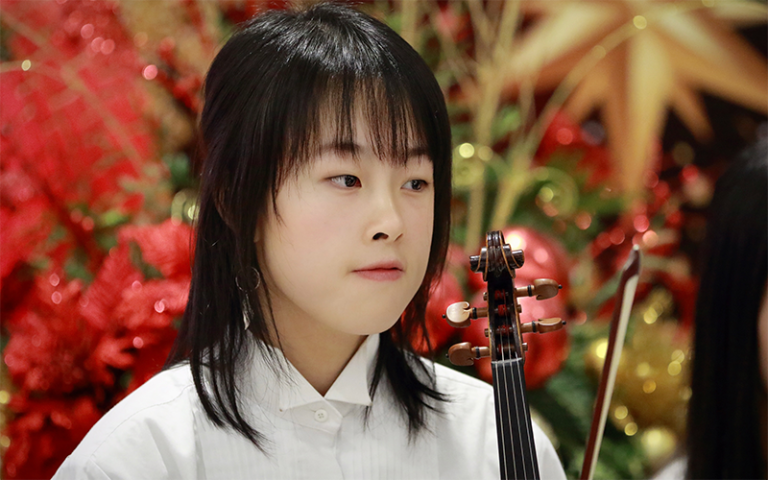Seven Questions with... Suzanna Chen
17 February 2023
This week we meet Suzanna, an Arts and Sciences student who hails from Canada! Here, she chats to us about her passion for increasing disability coverage in media and the latest projects she's been involved in as a VPEE Student Journalist.

What are you studying, why are you interested in this subject and what do you plan to do in the future?
I am a second-year student in the Bachelor of Arts and Sciences (BASc) programme, with a major in the Health and Environment pathway. While I try to diversify my modules to make sure I am getting the most out of my interdisciplinary degree, I tend to narrow down on discourses around disabilities in all of my modules, whether it’s psychology, politics, neuroscience, or linguistics. This is what BASc is about to me, though, as I can enrich my understanding of and contribute to discussions of a social topic (disabilities for me) using knowledge and perspectives from different disciplines. With what I will gain from the degree, I am thinking of pursuing a future in journalism or science policy concerning people with disabilities.
What is the most interesting thing you’ve done, seen or got involved with while at UCL?
There are many things I enjoy being involved in during my time at UCL. To name a few, I am a committee member of the UCL Data Visualisation Society, spoke at a UCL panel about the lived experiences of autistic people in conversations around Artificial Intelligence (AI), and was selected as one of the 10 Millennium Fellows on campus this year for my project to advance the United Nations’ Sustainable Development Goal (SDG) of Quality Education amongst neurodivergent students in higher education.
But I think the “most interesting” things I have done are all related to journalism. For example, I have been fortunate enough to be in the inaugural cohort of UCL’s office of the Vice-President External Engagement (VPEE)’s Student Journalism Scheme (SJS), where I get amazing opportunities to work alongside professional journalists within an established team and learning from a wealth of external speakers. Outside of UCL, I am also gaining experience in journalism by being editor-in-chief at The London Tab, an entirely student-run team breaking some of the biggest stories amongst students.
I am especially proud to be writing about the experiences of disabled students both for the SJS and external platforms. I hope my articles can amplify their voices and help facilitate meaningful and meaningful and constructive dialogue towards accessibility.
Have you discovered any hidden gems during your time at UCL?
I am not sure if I can call it a “hidden gem” since it is always hard to find a seat there on the weekends, but a small restaurant called Sandwich Street Kitchen near the Garden Halls serves great breakfast and meals! I also enjoy its quietness and homely atmosphere as it is pretty hidden away from the busy streets despite being so close to King’s Cross and Euston.
Give us your top three things to do/see/go to in London:
Unfortunately, I have not had enough chance to explore London with my academic and extracurricular commitments, so my suggestions probably sound like they are straight out of a tourist guide. But I would recommend visiting Kentish Town as a calmer and more sensory-friendly version of Camden Town (although that is definitely worth a visit as well!), spending a day or more to explore the Natural History Museum, and strolling along the Regent’s Canal near the King’s Cross area.
What’s one thing you’d like to see in a post-Covid world?
It is probably not the answer most people would expect, but I want to see virtual teaching and social options remain in a post-Covid world. While I totally understand people urging for a full return to what universities were like before the pandemic, I think it cannot be ignored that many disabled students, like myself, prefer having remote attendance alternatives for accessibility reasons.
On a bigger scale, I also think it would do the struggles and sacrifices we have all had to make over the pandemic an injustice if we try to reverse all the changes it brought forth. Should we not try to make the world better than it was before Covid with what we have learned instead of aspiring for what we started with? To me, realising that we actually can provide more accessible university experiences is one of the few positive things we can take away from the undeniable tragedy Covid-19 is for so many people worldwide. I hope we will not push it aside as the pandemic gradually fades into the background of our lives.
Who inspires you and why?
I am always inspired by the neurodivergent and disabled people working to make things better for themselves and everyone else. This includes anyone from famous advocates like Judith Heumann (who spoke at UCL last year), disabled journalists who pioneered the disability beat like Sara Luterman, to individual disabled students advocating for themselves and providing mutual support at UCL. In fact, being connected and working with students in the Disabled Students’ Network (DSN) and UCL Autism Society is one of the highlights of my university experiences so far!
What would it surprise people to know about you?
I think not many people would expect that I actually had a choice between UCL and a music school (Berklee College of Music in the US) as my university options! I have been a violinist for nearly 10 years now, and I have also dabbled in piano and guitar. It would be a lie to say there are no moments of regret for choosing a more academic route, but I am definitely thankful for the opportunities, connections, and experiences UCL has provided me. Ultimately, I think it only matters that I will continue trying to make the most of my time at UCL and enjoy it as much as possible.
 Close
Close

